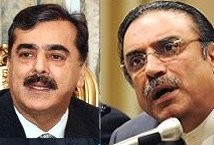Talks with Zardari can take positive turn with removal of 17th Amendment: Sharif
 Islamabad, Oct. 26: A positive outcome on talks with Pakistan President Asif Ali Zardari and Prime Minister Yousuf Raza Gilani can only emerge if the government abolishes the controversial 17th constitutional amendment, as agreed under the Charter of Democracy (CoD), said former Prime Minister and Pakistan Muslim League
Islamabad, Oct. 26: A positive outcome on talks with Pakistan President Asif Ali Zardari and Prime Minister Yousuf Raza Gilani can only emerge if the government abolishes the controversial 17th constitutional amendment, as agreed under the Charter of Democracy (CoD), said former Prime Minister and Pakistan Muslim League
(Nawaz) chief Nawaz Sharif on Monday.
Talking to journalists here, Sharif said there was no clear agenda for his meeting with Zardari, but added that all national issues will be discussed.
He said the PML-N was in the opposition but it never tried to destabilise the government.
The dawn quoted Sharif as saying that the country''s leaders should always keep Pakistan''s interest first when they reach agreements with other countries.
Zardari and Sharif are scheduled to meet each other on Monday during a banquet meeting being held in the honour of visiting Turkish Prime Minister Recep Tayyip Erdagon, but none of the sides have come out with any agenda for the talks.
Political pundits believe that Zardari, during the meeting, would try to pacify Sharif and win his support for the controversial National Reconciliation Ordinance (NRO), which has already been submitted to parliament for discussion and approval.
However, experts do not foresee any breakthrough as Nawaz, in return for support for the NRO, is expected to demand at least immediate repeal of the 17th Amendment.
The 17th Amendment bars people from serving a third term as the country’s Prime Minister.
Sharif could also ask for a cut in presidential powers including the authority to appoint armed forces’ chiefs, experts believe.
Considering the past experiences of broken promises and mistrust between the two parties, it is highly unlikely that the meeting would yield something positive.
They feared that the failure of the meeting would once again see both the political parties indulge in confrontational politics similar to 1980s and 90s, which could then have a detrimental effect on the state’s law and order situation. (ANI)